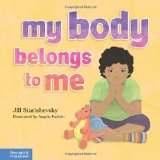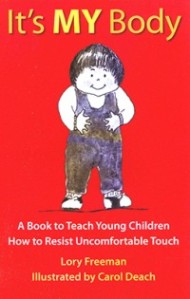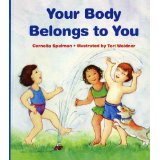Thank you so much for joining me on my blogging adventure. It may take me some time to find my groove, and you may see me jumping around a bit to different topics. Please comment on which topics are of most interest to you, and I will do my best to give you what you need and enjoy.
Today, I am writing on one of the topics I had in mind when I set up this website – advice for child life specialists, but my hope is that it will be helpful for teachers and caregivers as well. A wise man, Jon Luongo, advised me that I have a great deal of writing material squirreled away in the posts I have been making to the Child Life Forum for a number of years. Today I responded to a request on the Forum for information and resources regarding running a workshop for parents/caregivers on child abuse prevention. Below is the gist of my response.
If I were to lead such a workshop on prevention, I imagine including the following:
- A small amount of developmental content – info about how children think and feel at different ages
- Just a few statistics about types of abuse frequency, who are the perpetrators, etc. in order to dispel some myths.
- A short text-light and image-heavy brief powerpoint
- A read-aloud of a great children’s book. Check out the books listed on this website: selfesteemshop.com. I suggest reviewing any books cover to cover for appropriateness (consider culture, developmental stage of child, gender, any hints of blaming a child) before recommending them.
- The most important piece of the workshop would be the discussion that follows.
I have always gone back and forth in my mind about the importance of teaching kids how to say “this is my body”, being measured against the reality that children are not mini adults and are extraordinarily vulnerable to the power, manipulation and threats of pedophiles. Children are taught to respect and obey adults, especially ones they know. 80% of abusers are related to or close to the child. This makes things very dicey when we want our children to feel safe and trusting in the care of adults, yet still be able to say, “No! You aren’t supposed to touch me there.”
How do we teach the parents/caregivers how to empower the child, but not frighten the child with too much information? It is vital that we refrain from setting children up to blame themselves if they are unable to prevent abuse. Discussions about power, shame and how children think at different ages can help.
When I teach Child Abuse Detection and Reporting, I start off by asking for a show of hands: Who thinks they know someone who has been abused, an adult or a child, now or in the past? I go on to share the statistics of frequency of abuse, along with some other facts. A few of these are:
- If abuse happens to a child before a child is old enough to speak, there is no cognitive memory of it. But there may be a muscle memory or physical memory.
- Chances are if you didn’t raise your hand, you actually do know someone who has been abused. Stigma and shame go hand in hand with abuse, and non-reporting is common for both children and adults who look the other way because it is too awful to think about.
One of the most helpful words ever spoken to me were by Christine Low, a social worker at Mt. Sinai. “If you can’t imagine it, you will never be able to report it.” And I suppose we can add to that: “If you can’t imagine it, you will never be able to prevent it.” No one wants to think about these things happening to kids, theirs or anyone else’s. But we must imagine it if we are to protect our children.
One thing I have learned from teaching these workshops for many years is this. The more I know, the more I don’t know. These issues are a minefield of our deepest emotions, our cultural backgrounds and our life experiences. If the presenter takes an approach that reflects just how complicated this topic is, how we are incredibly influenced by our own experiences of abuse, and how there are no easy answers, she is probably on the right track. I recommend hanging back from taking the role of expert and instead taking the role of fellow explorer who has some great developmental “snacks” to share in your backpack.
For more info, go to: http://www.preventchildabuseny.org/resources/about-child-abuse/




Very informative post. I’m sure you’ll get lots of comments.
Love, Jeff
Date: Wed, 27 May 2015 17:20:22 +0000 To: jmkrauss@msn.com
LikeLike
Such an important post…and so much to think about here. Years ago, when I did jury duty for a child manslaughter case, the district attorney asked each of us, “Do you believe that this kind of abuse is actually done to children?” I think she needed to know that we were open to witnessing the difficult evidence that she was going to present to us. It was a powerful moment.
LikeLiked by 2 people
As a recently retired School Nurse I worked in a elementary building where the teachers refused to call C&Y, even though they were the 1st to notice and then questioned the child; so I did the reporting. I know the Guidance Counselor in our building used these books.
At the HS level, there was still parents, and also boyfriends who abused both physically and sexually.
I thought about purchasing the books when my granddaughter came along. However, her mom, my daughter, is a Supervisor for C&Y in our area and I know she has taught her daughter well…after all the horrors that she has seen.
LikeLike
“If you can’t imagine it you will never be able to report it.” That quotation from Christine Low is a stunner. It makes me think of a short comment I have heard many times in child life offices: “I can’t.” Let’s say someone has come back to the office from rounds and blurts out, “Oh my gosh, did you even hear about the child in 21-b?” and then offers a verbal description of the trauma and suspicion of abuse. Those moments are like when the radio reports an accident on the side of the road and “rubbernecking delays.” Rubbernecking delays in the child life office. Someone in the office will often respond with, “I can’t.” The person who says it shakes their head. “Sorry, I just can’t even.”
Have you ever heard that? It is a pat phrase when something is too appalling, and the grind of care work feels like too much.
We need our offices and other offstage places to let our defenses down and vent our anger and helplessness to sympathetic ears. But I’m going to try to remember this post the next time I witness the shake of the head, the looking away because it is too awful to think about, and the words, “I can’t.” Maybe there is a way, with gentleness and love, to respond, “You can. You can imagine it, and you have to. So that you can report. And protect. Awful though it is.” Lots to come back to and keep thinking about in this post. Thank you Deb for addressing the tough stuff. – Jono
LikeLiked by 1 person